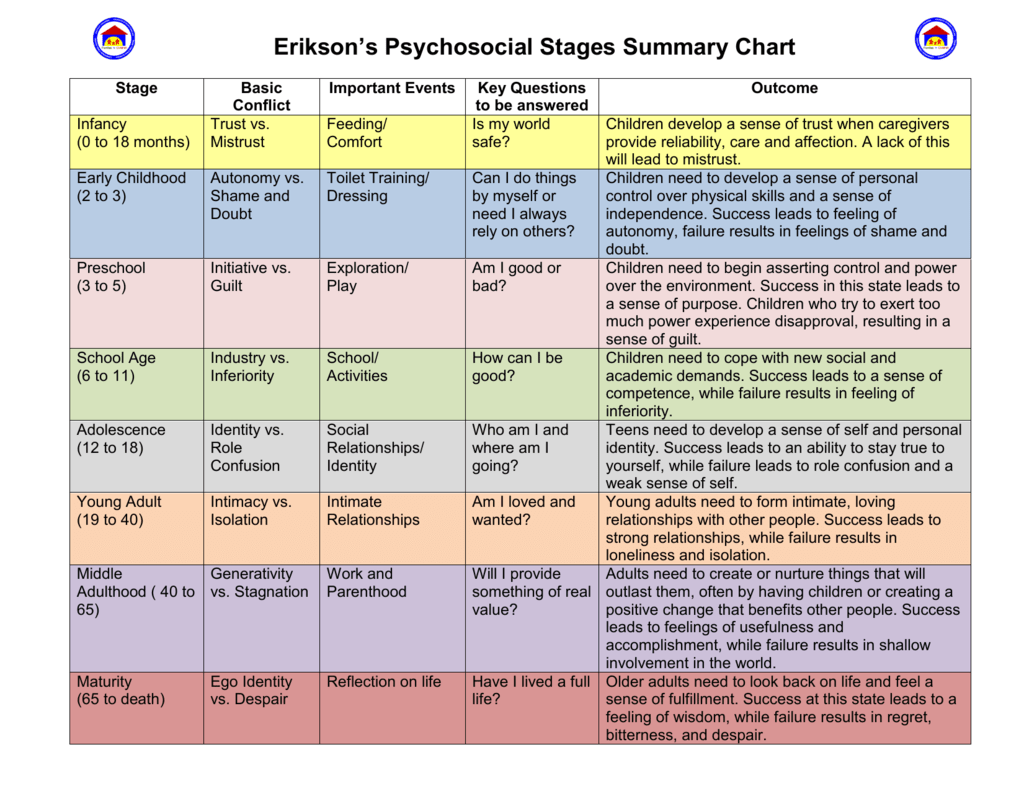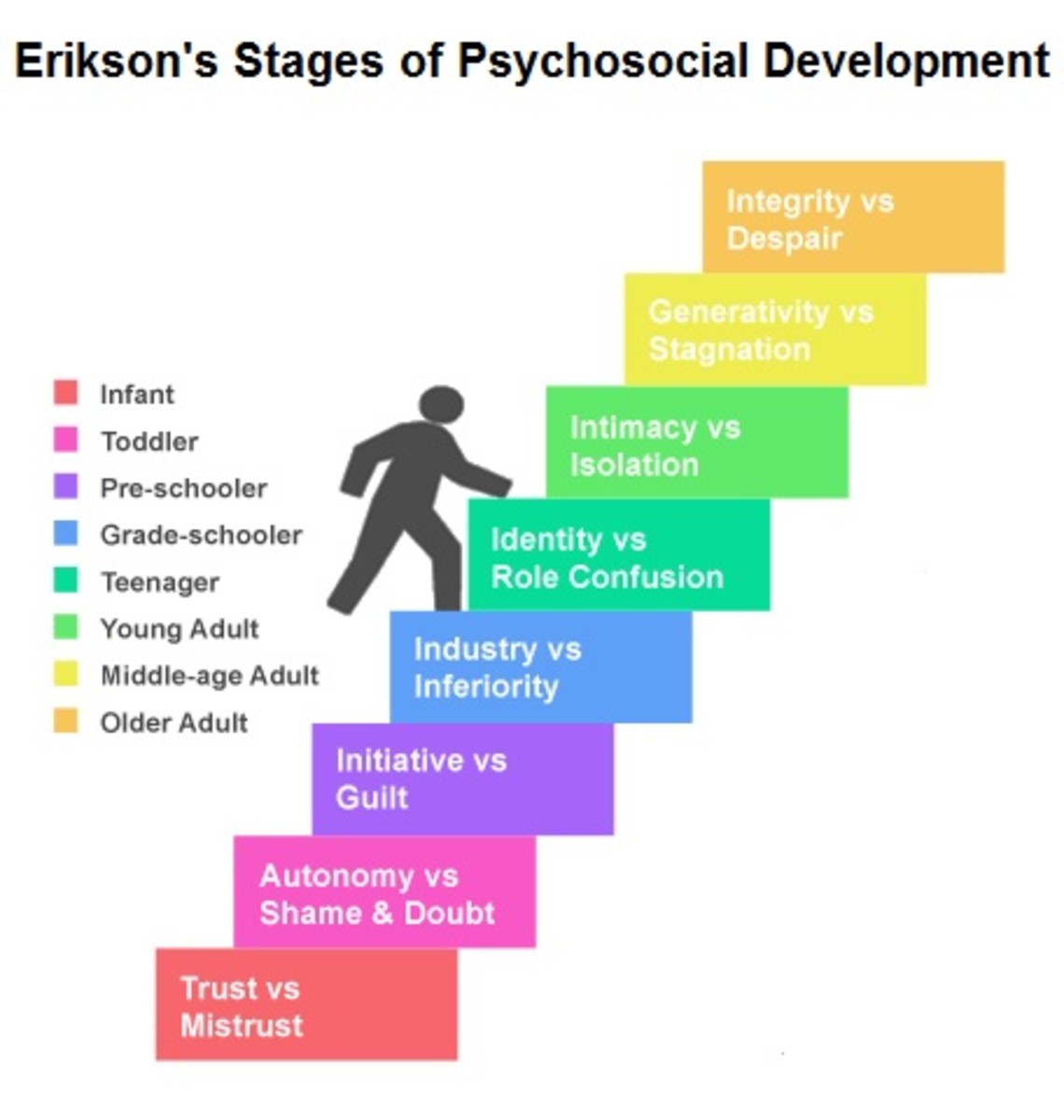So, at each developmental stage of our lives if we were successful in navigating the crisis stage. It was the adolescence stage that first piqued erikson’s interest, which led to the analysis of all stages of development.

😍 Erikson and psychosocial development. Initiative Vs. Guilt A Stage
This stage occurs during the first year of life and is seen as the child’s developing trust in their caregivers.

Erik erikson's model of psychosocial development. It built upon freud’s theory of psychosexual development by drawing parallels in childhood stages while expanding it to include the influence of social dynamics as well as the extension of psychosocial development into adulthood. He argued that social experience was valuable throughout life, with each stage recognizable by the specific conflict we encounter between our psychological needs and the. Shame and doubt (2nd to 3rd year of life) stage 3:
Erikson’s stages of psychosocial development is a theory introduced in the 1950s by the psychologist and psychoanalyst erik erikson. Erik erikson’s 8 psychosocial stages of development saw that each stage is seen as a crisis that we all go through. Sense of inferiority (age 6.
Primordial mistrust (1st year of life) stage 2: During each stage, the person experiences a psychosocial crisis which could have a positive or negative outcome for personality development. Erikson’s theory of psychosocial development highlights 8 crucial stages in a person’s life, from birth until death.
Erik erikson’s psychosocial development theory proposed that throughout our lives, we encounter certain crises that contribute to our psychosocial development. The first stage in this theory is called the trust vs. He presented the ego “in development” as personal identity, shaped and molded by an individual’s experiences.
Erik erikson’s (1958, 1963) psychosocial development theory proposes that our personality develops through eight stages, from infancy to old age. Influenced heavily by freud’s work, erik erikson conceptualized 8 stages of psychosocial development where each stage of life has its own developmental tasks that have to be accomplished for the individual to be able to move into the next, more mature level of thinking and functioning. Erikson's stages of psychosocial development, as articulated in the second half of the 20th century by erik erikson in collaboration with joan erikson, is a comprehensive psychoanalytic theory that identifies a series of eight stages that a healthy developing individual should pass through from infancy to late adulthood.according to erikson's theory the results from each.
Erikson was a student of freud’s and expanded on his theory of psychosexual development by emphasizing the importance of culture in parenting practices and motivations and adding. Legg, phd, psyd — written by rhona lewis on april 28, 2020 1. Erikson maintained that personality develops in a predetermined order through eight stages of psychosocial development, from infancy to adulthood.
Erikson’s psychosocial theory is a way of learning about people. Erikson was a student of anna freud, studying to become a psychoanalyst. He presented these crises as 8 stages of psychosocial conflicts, often known as the 8 erikson stages.
Each of the eight erikson stages is characterized by two contradictory emotional forces known as contrary. The theory proposed by erik erikson that ego identity is gradually achieved by facing goals and challenges during eight stages of development across the lifespan. One such suggestion is that as each of erikson's developmental stages is triggered by a crisis, in therapy it is triggered by the client's search.
Erikson’s stages of psychosocial development is a theory introduced in the 1950s by the psychologist and psychoanalyst erik erikson. Successfully passing these stages will ensure a productive and fulfilling life. Erikson’s 8 stages of psychosocial development, explained for parents medically reviewed by timothy j.
For erikson (1958, 1963), these crises are of a. Kids learn that their environment is safe and trustworthy when they are in this stage. From birth to 1 yr, the primary developmental task is to.
The stages are (a) infancy: Guilt (4 to 5 years of age) stage 4: It built upon freud’s theory of psychosexual development by drawing parallels in childhood stages while expanding it to include the influence of social dynamics as well as the extension of psychosocial development into adulthood.[1] it.
However, if we were unsuccessful then there would be a negative impact. Erikson’s eight stages of psychosocial development. In other words, as you relate to other people, you go through a series of eight stages in which the goal is to develop a coherent sense of self,.
The adolescence stage begins at puberty and lasts until one is fully an adult, between 18 and 20 years old. The child is developing physically and becoming more mobile, and discovering that he or During each of erikson’s eight development stages, two conflicting ideas must be resolved successfully in order for a person to become a confident, contributing member of society.
Psychologist erikson viewed personality as a product of social interactions and the choices a person makes in life. It is in these situations that you develop your character. Life is a serious of lessons and challenges which help us to grow.
Autonomy versus shame and doubt is the second stage of erik erikson's stages of psychosocial development. Autonomy versus shame and doubt; This stage occurs between the ages of 18 months to approximately 3 years.
Then positive development of the psyche would be achieved. Erik erikson's psychosocial development model has been a leading theory on the stages of human development since 1963.

The Lifespan Development Perspective of Erik Erikson and Daniel

Falcour's Spot Erik Erikson's Psychosocial Development

Eriksons Stages of Psychosocial Dev Piaget stages of development

Erikson's Stages Of Development Erikson's Stage Theory more social

Erikson's Stages of Psychosocial Development Stages of psychosocial